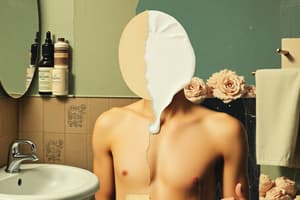Podcast
Questions and Answers
An individual who meticulously maintains a clean and healthy lifestyle notices a persistent body odor. Which underlying factor is MOST likely contributing to this issue, despite their diligent hygiene practices?
An individual who meticulously maintains a clean and healthy lifestyle notices a persistent body odor. Which underlying factor is MOST likely contributing to this issue, despite their diligent hygiene practices?
- Overuse of antiperspirants, leading to a buildup of chemicals that react with sweat.
- A genetic predisposition causing an overproduction of apocrine gland secretions with a unique reaction to skin bacteria. (correct)
- The type of soap used is not effectively killing the bacteria on their skin.
- Inadequate rinsing of shampoo and conditioner, leading to a breeding ground for odor-causing bacteria on the scalp.
A dermatologist is advising a patient with persistent acne and oily skin on a comprehensive skincare routine. Beyond the standard recommendations, what additional advice would BEST address the underlying causes and prevent future breakouts?
A dermatologist is advising a patient with persistent acne and oily skin on a comprehensive skincare routine. Beyond the standard recommendations, what additional advice would BEST address the underlying causes and prevent future breakouts?
- Washing the face more frequently throughout the day to remove excess oil and prevent pore clogging.
- Applying a thick layer of moisturizer to hydrate the skin and prevent overproduction of oil.
- Using a facial scrub with coarse granules to exfoliate the skin deeply and remove dead skin cells.
- Identifying and managing stress triggers to minimize hormonal fluctuations that contribute to acne. (correct)
An athlete is seeking advice on minimizing body odor during intense training sessions. Considering the interplay between sweat glands and bacteria, what strategy would be MOST effective?
An athlete is seeking advice on minimizing body odor during intense training sessions. Considering the interplay between sweat glands and bacteria, what strategy would be MOST effective?
- Applying deodorant immediately after showering, regardless of skin dryness.
- Shaving areas with apocrine glands to reduce sweat production.
- Using antibacterial wipes periodically throughout the workout to eliminate surface bacteria. (correct)
- Wearing tight-fitting synthetic clothing to minimize sweat absorption.
An individual with fine, oily hair is experiencing persistent product buildup and a greasy scalp, despite frequent washing. What adjustment to their hair care routine would MOST effectively address this issue?
An individual with fine, oily hair is experiencing persistent product buildup and a greasy scalp, despite frequent washing. What adjustment to their hair care routine would MOST effectively address this issue?
A teenager is concerned about the ethical implications of using antiperspirants. What would be the MOST accurate and comprehensive response to address their concerns?
A teenager is concerned about the ethical implications of using antiperspirants. What would be the MOST accurate and comprehensive response to address their concerns?
A person wants to minimize their environmental impact while maintaining good personal hygiene. What eco-friendly alternative to traditional hygiene products would be MOST effective and sustainable?
A person wants to minimize their environmental impact while maintaining good personal hygiene. What eco-friendly alternative to traditional hygiene products would be MOST effective and sustainable?
An individual, experiencing increased hair shedding and thinning, seeks advice on maintaining healthy hair growth. Beyond basic hair care, what specific nutritional consideration would be MOST relevant?
An individual, experiencing increased hair shedding and thinning, seeks advice on maintaining healthy hair growth. Beyond basic hair care, what specific nutritional consideration would be MOST relevant?
A person with sensitive gums is seeking advice on optimizing their dental hygiene routine. Beyond the standard recommendations, what specific technique would be MOST beneficial?
A person with sensitive gums is seeking advice on optimizing their dental hygiene routine. Beyond the standard recommendations, what specific technique would be MOST beneficial?
Flashcards
Eccrine Glands
Eccrine Glands
Glands present from birth that produce odorless sweat for cooling.
Apocrine Glands
Apocrine Glands
Sweat glands that develop during puberty and cause body odor when sweat mixes with bacteria.
Deodorant
Deodorant
A product that masks body odor with fragrance.
Antiperspirant
Antiperspirant
Signup and view all the flashcards
Shampoo
Shampoo
Signup and view all the flashcards
Conditioner
Conditioner
Signup and view all the flashcards
Body Hair Removal
Body Hair Removal
Signup and view all the flashcards
Toothbrushing
Toothbrushing
Signup and view all the flashcards
Study Notes
- Sweat performs the important protective function of cooling the body.
Eccrine and Apocrine Glands
- You are born with eccrine glands
- Eccrine glands do not produce an odor.
- Apocrine glands develop during puberty.
- Apocrine glands produce body odor (B.O) when sweat mixes with bacteria.
- Apocrine glands are located under the arms, in the genital area, and on the scalp.
- Sweat becomes smelly when it mixes with bacteria on the skin.
- Sweat production is unavoidable and normal.
Body Care Tips
- Bathe and wash hair frequently to remove dirt and oil that can mix with sweat and cause odor.
- Underwear and socks should be changed daily, with clothes changed regularly.
- If active, change clothes during the day.
- Use deodorant or antiperspirant on clean skin after washing and drying.
- Deodorant covers up body odor.
- Antiperspirants temporarily block sweat pores, reducing wetness and mixing with bacteria on the skin.
Daily Facial Care
- Wash face twice daily (morning and night) with gentle soap or cleanser suited for your skin type.
- Use moisturizer and sunscreen to protect the skin's natural barrier.
- Wash pillowcases and sheets regularly.
- Avoid popping pimples, as this spreads bacteria.
- Manage stress.
- Do not scrub too hard
- If using makeup, choose oil-free products and wash brushes regularly.
- Drink water
Healthy Hair
- Dirt, dust, pollution, and sweat can cause hair to become dull or limp.
- Over-styling can damage hair through heat, rollers, brushes, over-teasing, or dyes.
- When using hair products, find ones best suited for your specific hair type, such as gel, mousse, wax, or hair spray.
Hair Care Tips
- Shampoos and conditioners should be used based on individual hair type.
- Shampoo removes dirt, oil, and hair products.
- Conditioner detangles and moisturizes hair.
- Rinse products thoroughly to prevent buildup on the scalp, which can lead to dandruff.
Body Hair
- During puberty, an increase in hair may occur on parts of the body like legs, underarms, chest, upper lip, or chin.
- Choosing to remove body hair is a personal choice, with shaving frequency varying.
Dental Care Tips
- Brush teeth with toothpaste for 2 minutes at least twice a day (morning and before bed).
- Use a soft bristle toothbrush to protect gums.
- Floss
- Rinse your mouth with water after eating or snacking if you don't have a toothbrush.
- Visit the dentist regularly for check-ups.
Staying Healthy
- Wash hands well.
- Cover coughs with your elbow or a tissue is necessary
- Stay home while sick.
Studying That Suits You
Use AI to generate personalized quizzes and flashcards to suit your learning preferences.



